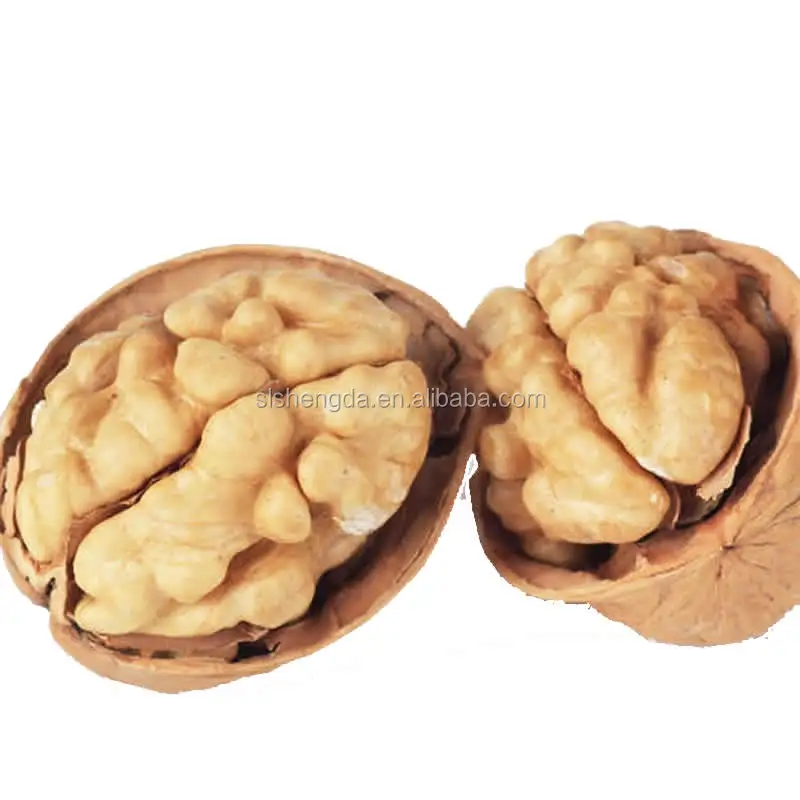Walnut with Shell Price per kg in China
Description



Walnut with shell price of the nut of any tree of the genus Juglans, particularly the Persian or English walnut, Juglans regia. A walnut is the edible seed of a drupe, and thus not a true botanical nut. It is commonly consumed as a nut. After full ripening for its edible seed when the shell has been discarded, it is used as a garnish or a snack. Nuts of the eastern black walnut and butternuts are less commonly consumed.
There at least 30 different cultivars types of walnut grown world-over. However, only three traditional varieties grown for their commercial purposes are English Walnut or Persian Walnut (Juglans regia), Black Walnut (Juglans nigra), and the White or Butternut Walnut (Juglans cinerea). Juglans species are medium sized, semi-tropical, deciduous trees believed to be originating in the mountain ranges of Central Asian or Southern Europe region. They are being cultivated at the commercial scale in the California, USA, Romania, France, Turkey, Ukraine, and China. After plantation, the tree takes approximately four years until it produces its first major crop.
During each season, walnuts can be ready for harvest by September when their thick green hull (thin-cover) begins to crack open to expose light-brown, hard-shelled “walnut” inside. It features roughly spherical shape, about the size of a small lemon, weighing about 10-15 g, and enclosing single (bi-lobed) edible kernel inside.
Structurally, the walnut kernel consists of two uneven, off-white color corrugated lobes; covered by a papery thin, light brown skin. The flaps loosely attached to each other at center.

Walnut with shell is nutritious kernels obtained from the tree belonging to the Juglandaceae family, in the genus, Juglans. The nuts have been revered since ancient times as the symbol of intellectuality. Their bi-lobed kernels feature convoluted surface resembling as that of a human brain! They enriched with many health-benefiting nutrients, especially omega-3 fatty acids that are essential for optimum health.
Walnuts are considered a heart-healthy snack that is rich in protein, antioxidants, and omega-3 fatty acids. Many studies have explored the numerous health benefits walnuts have to offer, and the versatility of these tree nuts makes it easy to incorporate them into your diet.
Walnuts are a rich source of energy and hold many health-benefiting nutrients, minerals, antioxidants and vitamins that are essential for wellbeing.
See the table below for in depth analysis of nutrients, walnuts (Juglans regia), Nutritional value per 100 g.
| Principle | Nutrient Value | Percentage of RDA |
| Energy | 654 Kcal | 33% |
| Carbohydrates | 13.71 g | 11% |
| Protein | 15.23 g | 27% |
| Total Fat | 65.21 g | 217% |
| Cholesterol | 0 mg | 0% |
| Dietary Fiber | 6.7 g | 18% |
| Vitamins | ||
| Folates | 98 μg | 24% |
| Niacin | 1.125 mg | 7% |
| Pantothenic Acid | 0.570 mg | 11% |
| Pyridoxine | 0.537 mg | 41% |
| Riboflavin | 0.150 mg | 11.5% |
| Thiamin | 0.341 mg | 28% |
| Vitamin A | 20 lU | 0.5% |
| Vitamin C | 1.3 mg | 2% |
| Vitamin E | 20.83 mg | 139% |
| Vitamin K | 2.7 μg | 2% |
| Electrolytes | ||
| Sodium | 2 mg | 0% |
| Potassium | 441 mg | 9% |
| Minerals | ||
| Calcium | 98 mg | 10% |
| Copper | 1.5 mg | 167% |
| Iron | 2.9 mg | 36% |
| Magnesium | 158 mg | 39.5% |
| Manganese | 3.4 mg | 148% |
| Phosphorus | 346 mg | 49% |
| Selenium | 4.9 μg | 9% |
| Zinc | 3.09 mg | 28% |
| Phyto-nutrients | ||
| Carotene-β | 12 μg | — |
| Crypto-xanthin-β | 0 μg | — |
| Lutein-zeaxanthin | 9 μg | — |

1. Walnuts are a rich source of energy and hold many health-benefiting nutrients, minerals, antioxidants and vitamins that are essential for wellbeing.
2. They are a rich source of monounsaturated fatty acids (about 72%) like oleic acid and an excellent source of all-important omega-3 essential fatty acids such as linoleic acid, alpha-linolenic acid (ALA) and arachidonic acids. Regular consumption of walnuts in the diet, therefore, may help in lowering total as well as LDL or “bad cholesterol” and increases HDL or “good cholesterol” levels in the blood.
3. Research studies suggest that the Mediterranean diet which is rich in mono-unsaturated fatty acids, and omega-3 fatty acids may help cut-down chances of coronary artery disease, and strokes by favoring healthy blood lipid profile.
4. Eating as just as a handful (25 g) of walnuts every day can provide about 90% of RDI (recommended daily intake) of omega-3 fatty acids. Research studies suggest that n-3 fatty acids by their anti-inflammatory actions may help lower blood pressure, cut down coronary artery disease and stroke risk, and offer protection from breast, colon and prostate cancers.
5. Additionally, they are a rich source of many phytochemical substances that may contribute to their overall antioxidant activity, including melatonin, ellagic acid, vitamin-E, carotenoids, and polyphenolic compounds. These compounds are known to have potential health effects against cancer, aging, inflammation, and neurological diseases.
6. Scientists at the University of Scranton, Pennsylvania, had recently found that walnuts possess the highest levels of polyphenolic antioxidants of all the edible seeds and nuts. 100 g of the nuts carry 13,541 µmol TE (Trolox equivalents) of oxidant radical absorbance capacity (ORAC). Eating as many as six to seven walnuts a day could help stave off most of the disease-causing free radicals from the human body.
7. Further, they are an excellent source of vitamin-E, especially rich in γ -tocopherol; carry about 21 g per 100 g (about 140% of daily required levels). Vitamin-E is a powerful lipid soluble antioxidant essential for maintaining the integrity of cell membrane of mucosa and skin by protecting it from harmful oxygen-induced free radicals.
8. They are also packed with several important B-complex groups of vitamins such as riboflavin, niacin, thiamin, pantothenic acid, vitamin B-6, and folates.
9. They also very are a rich source of minerals such as manganese, copper, potassium, calcium, iron, magnesium, zinc, and selenium. Copper is a cofactor for many vital enzymes, including cytochrome C-oxidase and superoxide dismutase (other minerals function as co-factors for this enzyme are manganese and zinc). Zinc is a co-factor in many enzymes that regulate growth and development, gonadal development, digestion, and nucleic acid synthesis. Selenium is an important micronutrient, which functions as a co-factor for antioxidant enzymes such as glutathione peroxidases.
10. Walnut oil has a deliciously nutty aroma and possess excellent astringent properties. When applied locally, it helps maintain skin moisture and protect from dryness. It has also been employed in cooking, and as “carrier or base oil” in traditional medicines in massage therapy, aromatherapy, in the pharmaceutical and cosmetic industry.
Munch a handful of walnuts a day and you will get enough of recommended levels of minerals, vitamins, and protein.

1. Walnut with shell can be available year round in the markets. In the stores, you may get to see different forms of kernels put for sale; unshelled, shelled (without the shell), salted, sweetened, or ground, etc. Buy whole, “unshelled” nuts instead of processed ones.
2. While buying, look at the nuts that should feature bright brown color, compact, uniform in size and feel heavy in hand. They should be free from cracks, mold, and spots and rancid smell.
3. Unshelled walnut can be placed in a cool, dry place for many months, whereas shelled (without the outer shell) kernels should be placed inside airtight container and kept in the refrigerator to avoid them turn rancid.

1. Our Shangluo Shengda Industrial Corporation Limited has been exporting the walnuts and walnut kernel for over 20 years, we are familar with Chinese different places of walnuts origins and their different features.
2. Now, we are mainly deal with the Xinjiang 185, Xinjiang 2 and Xinjiang 33 walnuts that are origin in Xinjiang, China, where is the biggest walnut planting base in China.
3. Xinjiang185 walnut in shell is featured with big size, rough thin shell, high kernel output percent, normal oil content.
4. Xinjiang 2 unshelled walnut is featured with nice thin shell, good taste, normal kernel output percent, better oil content.
5. Xinjiang 33 walnut with shell is featured with normal shell, good taste, high kernel output, good oil content.




Additional information
| Type: | Walnut |
|---|---|
| Cultivation Type: | COMMON |
| Processing Type: | Raw |
| Style: | Dried |
| Packaging: | 20Kgs, 25Kgs, 50Lbs Bag |
| Certification: | HACCP |
| Grade: | Class A++ |
| Use: | Nuts Food, Snack Food |
| Place of Origin: | Xinjiang, China |
| Brand Name: | Shengda |
| Model Number: | Wen185 |
| Product Name: | Walnut with Shell |
| Natural Dried Walnut Nut: | Walnut in Shell |
| Size: | 32+mm |
| Packing: | 20Kgs, 25Kgs, 50Lbs Bag |
| Origin: | Xinjiang |
| Keywords: | Walnut with Shell |
| Crop: | 2020 New Crop |
| Quality: | 100% Natural Chinese Walnuts |
| Taste: | Delicious |
| Delivery Time: | In Stock |
